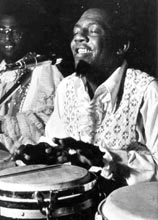11.4.3 Pedro Izquierdo (Pello the Afrocan).

Pedro Izquierdo, known as Pello el Afrocán, was the creator of Mozambique, drawing on the roots of Cuban music and African influences. The new rhythm quickly captured the attention of national and international media, achieving incredible success with a large following. This valuable Cuban musician earned the admiration and respect of a wide variety of audiences with his sonorous performances.
He developed in an environment with strong Afro-Cuban musical traditions. He was a member of various groups as a percussionist until he founded Mozambique in 1963 and performed extensively with his own orchestra, initially using twelve congas, two bass drums, three bells, a pan, four trumpets, and three trombones.
Pello also musically directed countless shows and was the main attraction at the Havana carnivals, as well as a star figure at the internationally known Cabaret Tropicana (Calle 72 No. 4504, Marianao, Havana City), with his productions Fantasía and Ses-se-ribo.
Dressed in a typical hat, surrounded by his numerous drums and trumpets, he made millions of Nuevitas residents and visitors dance with songs such as “María Caracoles,” “Camina como cómico,” and “Ileana quiere chocolate,” among others.
She performed on various Cuban and international stages, including the Olympia in Paris in 1965. In 1979, she appeared at Carnegie Hall in New York, performing at the Diaspora Festival. She later toured Spain, participating in the Gran Canaria Festival, where she won the award for best foreign guest group. She also performed in Asian countries such as Japan.
In 1980, they won the award for Best Artistic Group at the Havana Carnival, where they also received six additional awards: Press, Radio and TV, UNEAC, Mujeres Magazine, Muchachas, and Bohemia.
He died in Havana on September 11, 2000. With his colorful performance, Pello el Afrocán earned the admiration and respect of audiences of all ages, both in Cuba and abroad.








